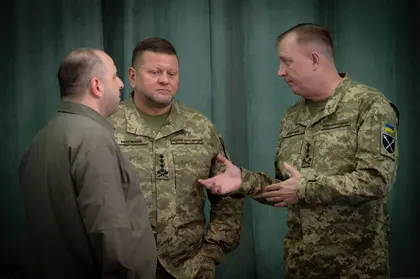Ihor Zhovkva, Deputy Head of the President's Office, has advised military officials against publicly disclosing sensitive information about the situation at the front lines.
Zhovkva's comments came in response to an interview with Valery Zaluzhny, the Commander-in-chief of the Armed Forces of Ukraine, for The Economist. The interview also contained a link to a lengthy essay by Zaluzhny replete with military assessments.
JOIN US ON TELEGRAM
Follow our coverage of the war on the @Kyivpost_official.
The deputy chief-of-staff suggested that by making comments "we make it easier for the aggressor to work."
Speaking on a national TV on Saturday, Nov. 4, Zhovkva said: "I am sure that everything has been read very carefully, recorded, and conclusions have been drawn. If we somehow succeed in this way, perhaps this is a very deep strategic plan." He was likely alluding to speculation that Zaluzhny's revelations may have been a ploy to increase Western aid or lull the enemy into a false sense of security.
"But that would surprise me," the official added.
Zhovkva further revealed that, following the publication of Zaluzhny's article and interview, he received a call from an unspecified "official of leaders' cabinet," who expressed concern and panic, asking: "What should I report to my boss? Is it really a stalemate?" Zhovkva also questioned: "Are we trying to achieve some sort of effect with this article?"
What did Zaluzhny actually say in his latest interview?

Latest on Russia’s Intransigence to End War Against Ukraine
Valery Zaluzhny, the head of Ukraine's Armed Forces, said that the situation on the front lines has "reached a deadlock." He warned that the ongoing Ukrainian offensive is at risk of evolving into a protracted positional warfare that could extend for years.
Just like in the First World War, we have reached the level of technology that puts us into a stalemate," he told the Economist, adding that: "There will most likely be no deep and beautiful breakthrough."
General Zaluzhny believes a significant technological breakthrough is needed to change the situation, and he doesn't anticipate any rapid or substantial advancements.
“The simple fact is that we see everything the enemy is doing, and they see everything we are doing. In order for us to break this deadlock, we need something new, like the gunpowder which the Chinese invented and which we are still using to kill each other,” he added.
Given that a technological breakthrough is not expected in the near future, the Ukrainian army can only continue the offensive, maintaining the initiative in order not to allow the war to become positional, Zaluzhny said.
“The biggest risk of an attritional trench war is that it can drag on for years and wear down the Ukrainian state,” he says.
Earlier, The Economist published an article by Zaluzhny, in which he stated that the war between Russia and Ukraine is moving towards a stalemate with grueling battles.
You can also highlight the text and press Ctrl + Enter










